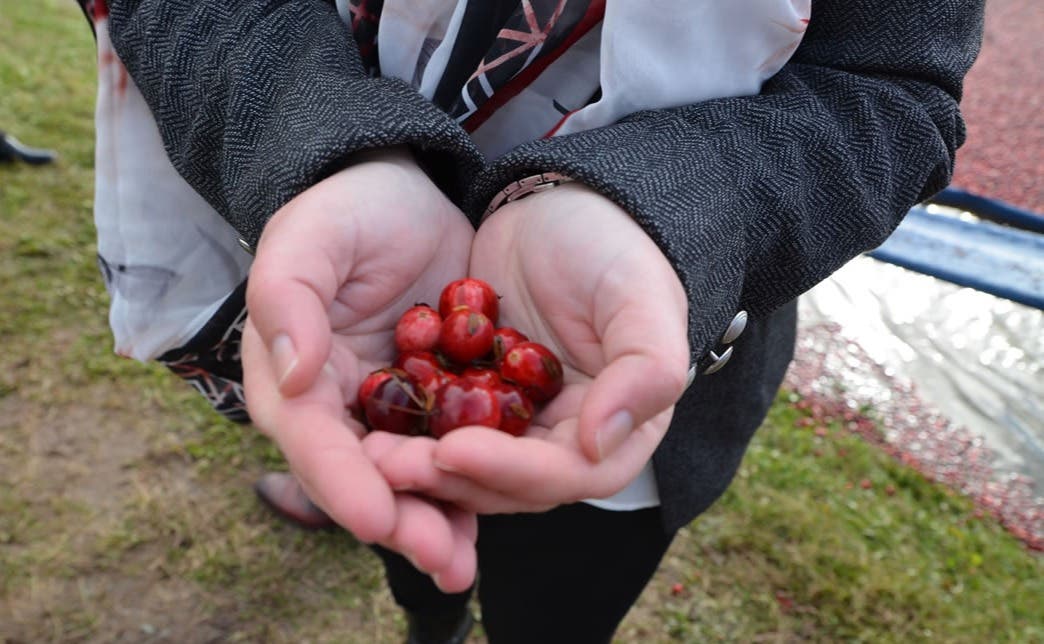Cranberries can improve memory and ward off dementia
Adding cranberries to your diet could help improve memory and brain function, and lower ‘bad’ cholesterol – according to new research.

[May 21, 2022: Lisa Horton, University of East Anglia]
Adding cranberries to your diet could help improve memory and brain function. (CREDIT: Creative Commons)
Adding cranberries to your diet could help improve memory and brain function, and lower ‘bad’ cholesterol – according to new research from the University of East Anglia (UK).
A new study published today highlights the neuroprotective potential of cranberries.
The research team studied the benefits of consuming the equivalent of a cup of cranberries a day among 50 to 80-year-olds.
They hope that their findings could have implications for the prevention of neurodegenerative diseases such as dementia.
Lead researcher Dr David Vauzour, from UEA’s Norwich Medical School, said: “Dementia is expected to affect around 152 million people by 2050. There is no known cure, so it is crucial that we seek modifiable lifestyle interventions, such as diet, that could help lessen disease risk and burden.
“Past studies have shown that higher dietary flavonoid intake is associated with slower rates of cognitive decline and dementia. And foods rich in anthocyanins and proanthocyanidins, which give berries their red, blue, or purple colour, have been found to improve cognition.
Related Stories
“Cranberries are rich in these micronutrients and have been recognized for their antioxidant and anti-inflammatory properties.
“We wanted to find out more about how cranberries could help reduce age-related neurodegeneration.”
The research team investigated the impact of eating cranberries for 12 weeks on brain function and cholesterol among 60 cognitively healthy participants.
Half of the participants consumed freeze-dried cranberry powder, equivalent to a cup or 100g of fresh cranberries, daily. The other half consumed a placebo.
The study is one of the first to examine cranberries and their long-term impact on cognition and brain health in humans.
The results showed that consuming cranberries significantly improved the participants’ memory of everyday events (visual episodic memory), neural functioning and delivery of blood to the brain (brain perfusion).
Dr Vauzour said: “We found that the participants who consumed the cranberry powder showed significantly improved episodic memory performance in combination with improved circulation of essential nutrients such as oxygen and glucose to important parts of the brain that support cognition – specifically memory consolidation and retrieval.
“The cranberry group also exhibited a significant decrease in LDL or ‘bad’ cholesterol levels, known to contribute to atherosclerosis – the thickening or hardening of the arteries caused by a build-up of plaque in the inner lining of an artery. This supports the idea that cranberries can improve vascular health and may in part contribute to the improvement in brain perfusion and cognition.
“Demonstrating in humans that cranberry supplementation can improve cognitive performance and identifying some of the mechanisms responsible is an important step for this research field.
“The findings of this study are very encouraging, especially considering that a relatively short 12-week cranberry intervention was able to produce significant improvements in memory and neural function,” he added.
“This establishes an important foundation for future research in the area of cranberries and neurological health.”
The study was supported by a grant from The Cranberry Institute. It was led by the University of East Anglia in collaboration with researchers at the Leiden University Medical Center (Netherlands), the University of Parma (Italy) and the Quadram Institute (UK).
‘Chronic consumption of Cranberries (Vaccinium macrocarpon) for 12 weeks improves episodic memory and regional brain perfusion in healthy older adults: A randomised, placebo-controlled, parallel-groups study’ is published in the journal Frontiers in Nutrition.
Note: Materials provided above by University of East Anglia. Content may be edited for style and length.
Like these kind of feel good stories? Get the Brighter Side of News' newsletter.
Tags: #New_Discoveries, #Global_Good_News, #Cranberries, #Medical_Good_News, #Dementia, #Neuroscience, #Research, #Science, #Brain, #The_Brighter_Side_of_News
Joseph Shavit
Head Science News Writer | Communicating Innovation & Discovery
Based in Los Angeles, Joseph Shavit is an accomplished science journalist, head science news writer and co-founder at The Brighter Side of News, where he translates cutting-edge discoveries into compelling stories for a broad audience. With a strong background spanning science, business, product management, media leadership, and entrepreneurship, Joseph brings a unique perspective to science communication. His expertise allows him to uncover the intersection of technological advancements and market potential, shedding light on how groundbreaking research evolves into transformative products and industries.



